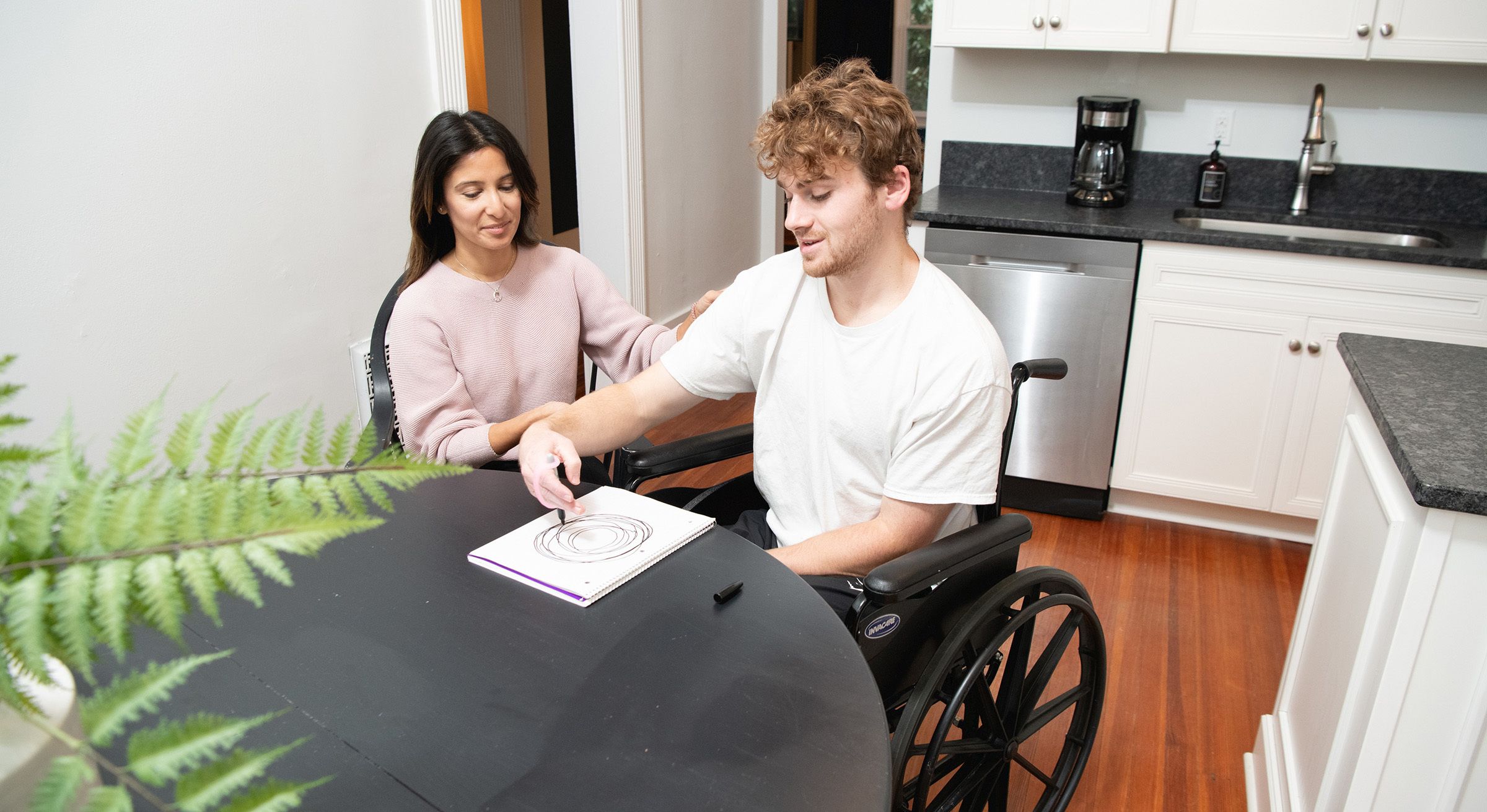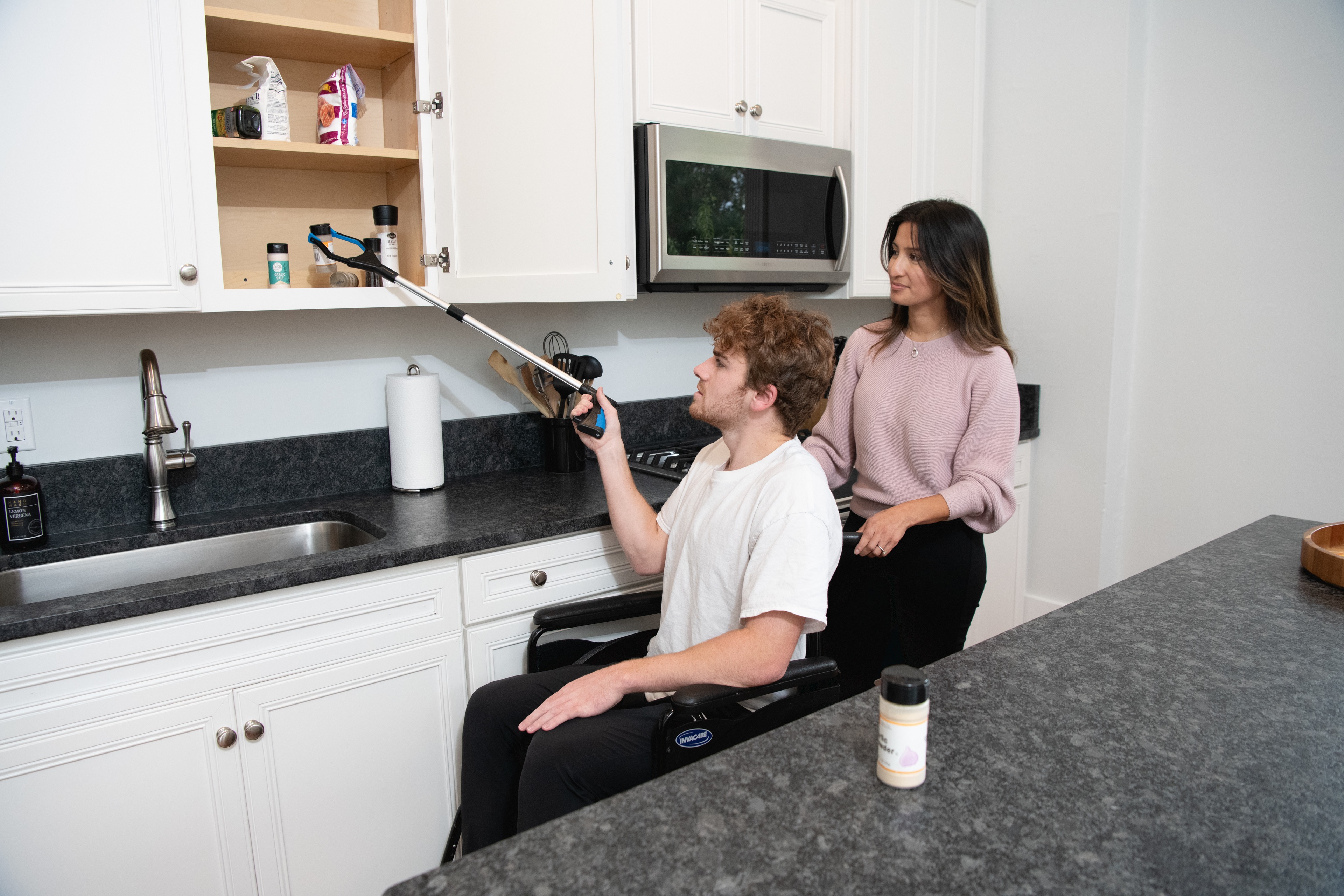
Doctorate
Blended
Occupational Therapy
An accelerated, hybrid Doctor of Occupational Therapy (OTD) program
The Bowling Green State University Doctor of Occupational Therapy program is the first and only public OTD program of its kind in Ohio.
Earn your OTD in just two years at BGSU with a combination of online and in-person coursework.
Our OTD program prepares practitioners who are compassionate, responsive and capable of making meaningful contributions to the health and well-being of individuals, populations and communities.
Our graduates are holistic occupational therapists who are committed to advancing the profession and embody the values of:
- Clinical reasoning
- Evidence-based practice
- Collaborative care
- Client-centered care
Program highlights
- Accelerated program. Earn your OTD degree in two years. Most doctoral – and even some master’s OT programs – take up to three years to complete. The two-year OTD model allows you to enter the workforce and start earning a salary sooner.
- Flexible, hybrid curriculum. Our approach combines the best practices of distance learning with the invaluable hands-on experience of on-campus, immersive labs. Pursue your degree from anywhere while staying connected to our vibrant academic community at BGSU.
- Academically rigorous. Our OTD program maintains high standards of quality and rigor. It is designed to prepare you for success in today's dynamic occupational therapy landscape.
- Cutting-edge technologies
- Diverse fieldwork placements
- Student-centered curriculum
- No GRE or on-campus interview required. BGSU offers an innovative approach to admissions and recruitment to increase diversity within our program and the profession. Faculty receive training in how to support diverse learners.
- Outstanding faculty. Learn from experienced educators who have practiced all over the country in diverse settings. Our faculty has created a program that prepares you to practice in today’s environment, while advocating and working to change the profession for the better.
- Academic support. Occupational therapy doctoral students are placed on a team of your peers and matched with a faculty member who will serve as your academic coach. Academic coaching is integral to academic success. Your coach will support you in achieving your goals, maintain clear and effective communication and create a collaborative and professional culture.
Career opportunities
The need for occupational therapists is expected to increase as the large baby-boom generation ages and people remain active later in life. Jobs in the field are projected to grow 12% from 2022 to 2032, much faster than the average for all occupations. The Bureau of Labor Statistics predicts about 9,600 job openings a year over the decade.
The median annual salary for occupational therapists was $96,370 in 2023. (Salaries vary based on a degree, location and other factors.)
Occupational therapy will continue to be an important part of treatment for people with various illnesses and disabilities, such as Alzheimer’s disease, cerebral palsy, autism, traumatic brain injury or the loss of a limb.
Career settings
- Home and community settings
- Hospitals
- Long-term care
- Mental and behavioral health settings
- Outpatient clinics
- Academia
- Schools, early intervention and other emerging settings
Quick Facts from the Bureau of Labor Statistics
Curriculum
The OTD curriculum is designed to:
- Equip entry-level occupational therapists with the required knowledge, skills and competencies for roles in occupational therapy
- Provide a comprehensive and evidence-based education
- Integrate theoretical foundations with practical experiences to prepare graduates for the diverse challenges of modern healthcare
- Prepare students to practice as generalists with broad exposure to current and emerging practice areas
The OTD curriculum is delivered across six semesters in two calendar years using an accelerated, hybrid learning delivery model.
The hybrid nature of the curriculum demands motivation, active engagement and openness to diverse learning methods from students.
- One year of full-time didactic education
- 24 weeks of Level II fieldwork experiences
- 14 weeks of the capstone experience
About half of our curriculum is made up of online synchronous and asynchronous courses. The other half is comprised of face-to-face lab immersion sessions.
Year One
You will come to campus for two weeks in every eight-week class session for hands-on psychomotor skill development in immersive lab experiences and Level I Fieldwork.
Year Two
You will come to campus two or three times. The final phase of the curriculum involves Level II Fieldwork placements and Capstone projects.
Attendance also is required at weekly sync sessions. We strongly recommend that students work no more than 10-12 hours/week given the demands of the accelerated delivery model.

Sample courses
- Foundations in OT Practice
- Research I: Foundations to Scholarly Review
- Functional Anatomy
- Human Development and Occupation Across the Lifespan
Our commitment to inclusion and belonging
The BGSU OTD program is committed to establishing and supporting an inclusive community of students, educators and staff to meet the needs of the occupational therapy workforce and better reflect the clients they serve.
Recognizing the significance of diversity in our profession, we embrace and value all dimensions of diversity. We respect the values, beliefs and opinions of all community members. We firmly believe an inclusive learning environment not only strengthens our community but also serves the public good.
The BGSU OTD program and the School of Physical and Occupational Therapy upholds a broad understanding of diversity. Diversity includes, but is not limited to, considerations of race and ethnicity, cultural backgrounds, religious affiliations, geography (rural, urban, regional), gender identity, sexual orientation, physical abilities, neurodiversity, varied backgrounds and life experiences, age/generational differences, veteran status and family structures.
The Doctorate of Occupational Therapy program is part of the School of Physical and Occupational Therapy in the BGSU College of Health & Human Services.
Accreditation
The Bowling Green State University entry-level occupational therapy doctoral degree program has applied for accreditation and has been granted Candidacy Status by the Accreditation Council for Occupational Therapy Education (ACOTE) of the American Occupational Therapy Association (AOTA), located at 7501 Wisconsin Ave., Suite 510E, Bethesda, MD 20814. ACOTE’s telephone number c/o AOTA is 301-652-AOTA, and its web address is www.acoteonline.org. The program must have a preaccreditation review, complete an on-site evaluation, and be granted Accreditation Status before its graduates will be eligible to sit for the national certification examination for the occupational therapist administered by the National Board for Certification in Occupational Therapy (NBCOT). After successful completion of this exam, the individual will be an Occupational Therapist, Registered (OTR). In addition, all states require licensure in order to practice; however, state licenses are usually based on the results of the NBCOT Certification Examination. Note that a felony conviction may affect a graduate’s ability to sit for the NBCOT certification examination or attain state licensure.
After successful completion of this exam, the individual will be an Occupational Therapist, Registered (OTR). In addition, all states require licensure in order to practice; however, state licenses are usually based on the results of the NBCOT Certification Examination. Note that a felony conviction may affect a graduate’s ability to sit for the NBCOT certification examination or attain state licensure.
Students must complete 24 weeks of Level II fieldwork as well as an individual 14-week capstone experience within 24 months following the completion of the didactic portion of the program. The doctoral capstone experience must be started after completion of all coursework and Level II fieldwork as well as completion of preparatory activities defined in 2023 ACOTE OTD Standard D.1.3.
Bowling Green State University is accredited by the Higher Learning Commission, a regional accreditation agency recognized by the U.S. Department of Education.
Learn more about pursuing your doctor of occupational therapy at BGSU
By submitting this form, I provide my express written consent for the Bowling Green State University Doctor of Occupational Therapy Program to contact me via email, text and/or telephone regarding furthering my education. I understand that contact may be generated using automated technology. Opt-out available at any time. Please view our Privacy policy or Contact Us for more details.
Updated: 12/20/2024 03:19PM

